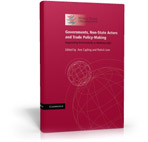
RESEARCH & ANALYSIS
Governments, Non-State Actors and Trade Policy-Making: Negotiating Preferentially or Multilaterally?
Using case studies from eight developing countries, this book presents the findings of a major international project that has investigated how non-state actors see their interests and seek to influence government policy in relation to preferential trade agreements and the WTO as alternative venues for trade cooperation.
See also:
> More
on Economic research and analysis
One of the most pressing issues confronting the multilateral trade system is the challenge posed by the rapid proliferation of preferential trade agreements. Plenty has been written about why governments might choose to negotiate preferentially or multilaterally, but until now it has been written almost exclusively from the perspective of governments. We know very little about how non-state actors view this issue of ‘forum choice’, nor how they position themselves to influence choices by governments about whether to emphasize preferential trade agreements or the WTO. This book addresses that issue squarely through case studies of trade policy-making and forum choice in eight developing countries: Chile, Colombia, Mexico, South Africa, Kenya, Jordan, Indonesia and Thailand. The case studies are based on original research by the authors, including interviews with state and non-state actors involved in the trade policy-making process in the eight countries of this study.
Edited by Ann Capling, University of Melbourne, and Patrick Low, WTO
Co-published with Cambridge University Press in 2010
> Download pdf of Table of
Contents and the Introduction
> Order printed copy